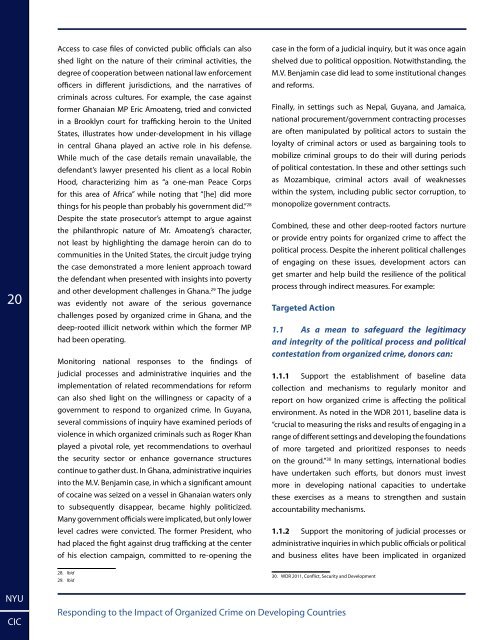here - Center on International Cooperation - New York University
here - Center on International Cooperation - New York University
here - Center on International Cooperation - New York University
Create successful ePaper yourself
Turn your PDF publications into a flip-book with our unique Google optimized e-Paper software.
20<br />
Access to case files of c<strong>on</strong>victed public officials can also<br />
shed light <strong>on</strong> the nature of their criminal activities, the<br />
degree of cooperati<strong>on</strong> between nati<strong>on</strong>al law enforcement<br />
officers in different jurisdicti<strong>on</strong>s, and the narratives of<br />
criminals across cultures. For example, the case against<br />
former Ghanaian MP Eric Amoateng, tried and c<strong>on</strong>victed<br />
in a Brooklyn court for trafficking heroin to the United<br />
States, illustrates how under-development in his village<br />
in central Ghana played an active role in his defense.<br />
While much of the case details remain unavailable, the<br />
defendant’s lawyer presented his client as a local Robin<br />
Hood, characterizing him as “a <strong>on</strong>e-man Peace Corps<br />
for this area of Africa” while noting that “[he] did more<br />
things for his people than probably his government did.” 28<br />
Despite the state prosecutor’s attempt to argue against<br />
the philanthropic nature of Mr. Amoateng’s character,<br />
not least by highlighting the damage heroin can do to<br />
communities in the United States, the circuit judge trying<br />
the case dem<strong>on</strong>strated a more lenient approach toward<br />
the defendant when presented with insights into poverty<br />
and other development challenges in Ghana. 29 The judge<br />
was evidently not aware of the serious governance<br />
challenges posed by organized crime in Ghana, and the<br />
deep-rooted illicit network within which the former MP<br />
had been operating.<br />
M<strong>on</strong>itoring nati<strong>on</strong>al resp<strong>on</strong>ses to the findings of<br />
judicial processes and administrative inquiries and the<br />
implementati<strong>on</strong> of related recommendati<strong>on</strong>s for reform<br />
can also shed light <strong>on</strong> the willingness or capacity of a<br />
government to resp<strong>on</strong>d to organized crime. In Guyana,<br />
several commissi<strong>on</strong>s of inquiry have examined periods of<br />
violence in which organized criminals such as Roger Khan<br />
played a pivotal role, yet recommendati<strong>on</strong>s to overhaul<br />
the security sector or enhance governance structures<br />
c<strong>on</strong>tinue to gather dust. In Ghana, administrative inquiries<br />
into the M.V. Benjamin case, in which a significant amount<br />
of cocaine was seized <strong>on</strong> a vessel in Ghanaian waters <strong>on</strong>ly<br />
to subsequently disappear, became highly politicized.<br />
Many government officials were implicated, but <strong>on</strong>ly lower<br />
level cadres were c<strong>on</strong>victed. The former President, who<br />
had placed the fight against drug trafficking at the center<br />
of his electi<strong>on</strong> campaign, committed to re-opening the<br />
case in the form of a judicial inquiry, but it was <strong>on</strong>ce again<br />
shelved due to political oppositi<strong>on</strong>. Notwithstanding, the<br />
M.V. Benjamin case did lead to some instituti<strong>on</strong>al changes<br />
and reforms.<br />
Finally, in settings such as Nepal, Guyana, and Jamaica,<br />
nati<strong>on</strong>al procurement/government c<strong>on</strong>tracting processes<br />
are often manipulated by political actors to sustain the<br />
loyalty of criminal actors or used as bargaining tools to<br />
mobilize criminal groups to do their will during periods<br />
of political c<strong>on</strong>testati<strong>on</strong>. In these and other settings such<br />
as Mozambique, criminal actors avail of weaknesses<br />
within the system, including public sector corrupti<strong>on</strong>, to<br />
m<strong>on</strong>opolize government c<strong>on</strong>tracts.<br />
Combined, these and other deep-rooted factors nurture<br />
or provide entry points for organized crime to affect the<br />
political process. Despite the in<str<strong>on</strong>g>here</str<strong>on</strong>g>nt political challenges<br />
of engaging <strong>on</strong> these issues, development actors can<br />
get smarter and help build the resilience of the political<br />
process through indirect measures. For example:<br />
Targeted Acti<strong>on</strong><br />
1.1 As a mean to safeguard the legitimacy<br />
and integrity of the political process and political<br />
c<strong>on</strong>testati<strong>on</strong> from organized crime, d<strong>on</strong>ors can:<br />
1.1.1 Support the establishment of baseline data<br />
collecti<strong>on</strong> and mechanisms to regularly m<strong>on</strong>itor and<br />
report <strong>on</strong> how organized crime is affecting the political<br />
envir<strong>on</strong>ment. As noted in the WDR 2011, baseline data is<br />
“crucial to measuring the risks and results of engaging in a<br />
range of different settings and developing the foundati<strong>on</strong>s<br />
of more targeted and prioritized resp<strong>on</strong>ses to needs<br />
<strong>on</strong> the ground.” 30 In many settings, internati<strong>on</strong>al bodies<br />
have undertaken such efforts, but d<strong>on</strong>ors must invest<br />
more in developing nati<strong>on</strong>al capacities to undertake<br />
these exercises as a means to strengthen and sustain<br />
accountability mechanisms.<br />
1.1.2 Support the m<strong>on</strong>itoring of judicial processes or<br />
administrative inquiries in which public officials or political<br />
and business elites have been implicated in organized<br />
28. Ibid<br />
29. Ibid<br />
30. WDR 2011, C<strong>on</strong>flict, Security and Development<br />
NYU<br />
CIC<br />
Resp<strong>on</strong>ding to the Impact of Organized Crime <strong>on</strong> Developing Countries
















